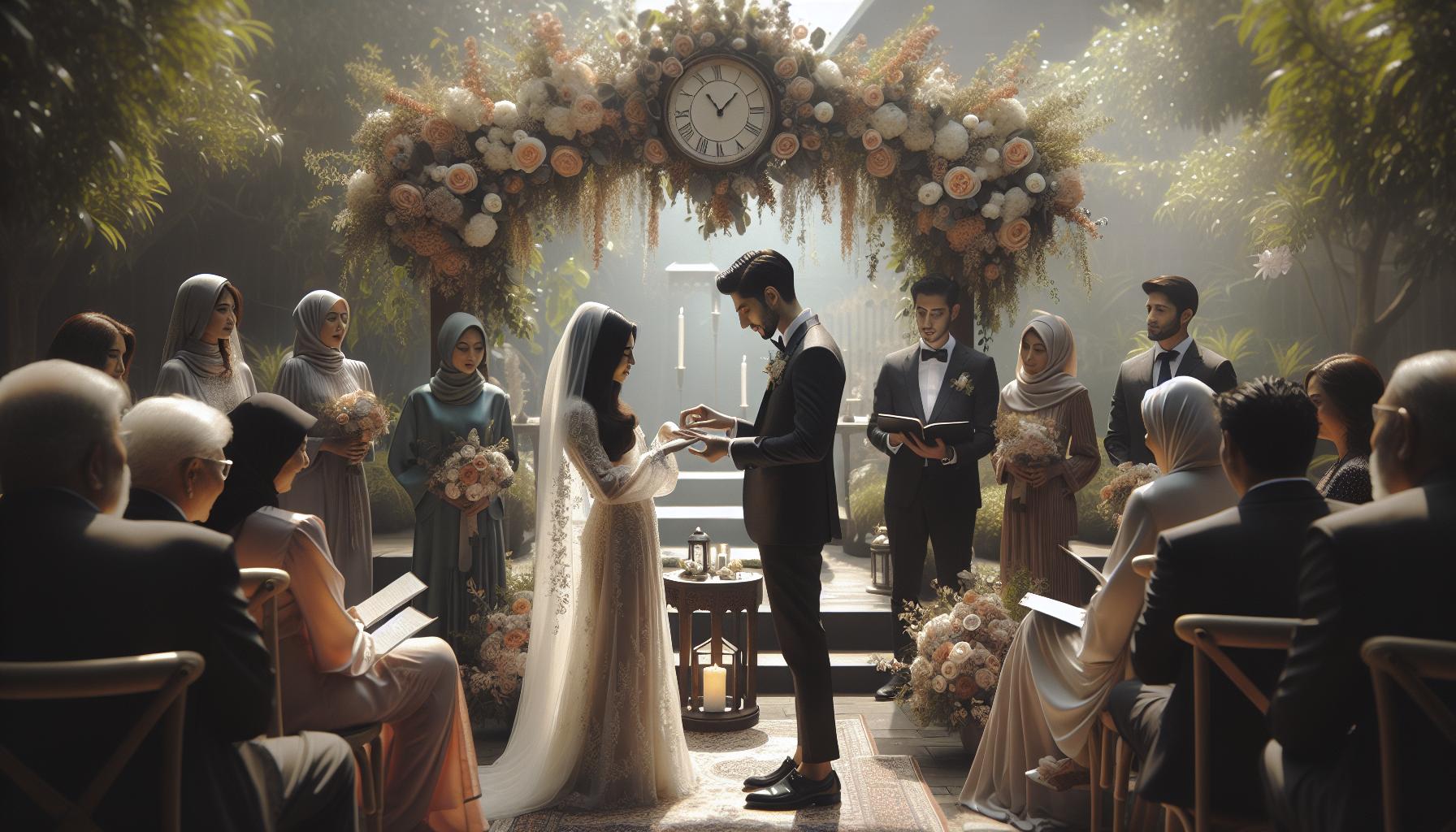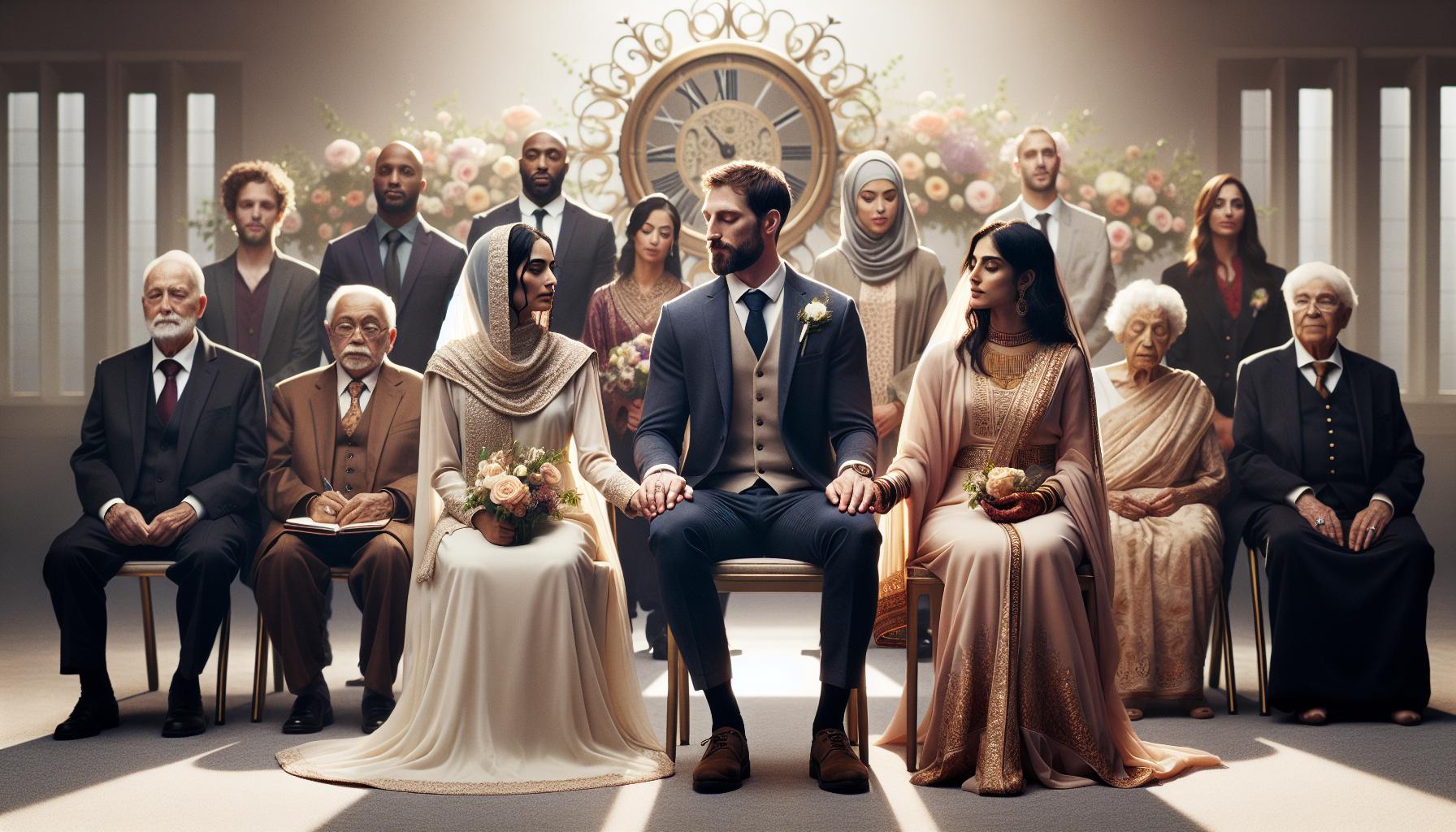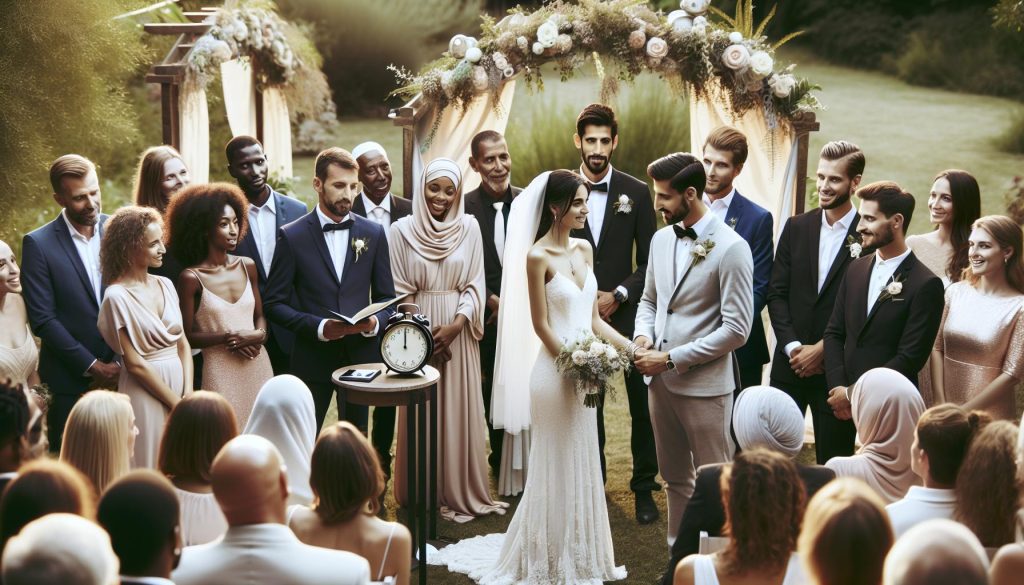Planning a wedding can feel overwhelming, especially when you’re trying to create a memorable ceremony that reflects your love story. Did you know that most wedding ceremonies last between 20 to 30 minutes? Understanding the typical duration is important not only for scheduling your day but also for ensuring that every cherished moment is perfectly timed. Whether you’re dreaming of a grand event or an intimate gathering, knowing how long to allocate for the ceremony helps you make informed decisions about other elements, like venue details and guest logistics. Join us as we dive into the intricacies of timing your wedding ceremony, providing you with valuable insights that will help you craft a beautiful and organized celebration.
Understanding the Average Wedding Ceremony Duration

The average wedding ceremony lasts about 20 to 30 minutes, but this timeframe can vary significantly based on various factors, including the type of ceremony, the rituals involved, and personal preferences. For couples tying the knot in traditional or religious settings, the ceremony might extend longer due to specific rites, readings, or musical performances that are vital to the experience. In contrast, a more casual outdoor wedding could be succinct, focusing primarily on the key vows and declarations.
To better understand the typical duration, consider these influences:
- Ceremony Style: Religious ceremonies often include multiple readings, blessings, and music, stretching the duration. Secular ceremonies may be more streamlined.
- Rituals and Traditions: Incorporating rituals such as unity candles, sand ceremonies, or cultural practices can add length but also deepen the significance.
- Guest Count: A larger guest list might necessitate more time for processional and recessional activities, while intimate ceremonies can move at a quicker pace.
An effective way to establish a timeline is to consider what elements hold the most meaning for you as a couple. Whether it’s saying personalized vows or including family heirlooms in the ceremony, focus on what resonates most with your love story. Understanding the average duration of wedding ceremonies provides a foundation for your planning, ensuring that you allocate sufficient time while still allowing room for spontaneity and joy.
Factors Influencing Wedding Ceremony Length

The length of a wedding ceremony can vary widely, shaped by a multitude of factors that cater to each couple’s unique vision. Understanding these elements can help ensure a smooth and meaningful event that resonates with the couple’s desires while respecting the guests’ time.
Several critical aspects come into play when determining how long your ceremony will last. The style of ceremony is a significant influence; religious or traditional ceremonies often include rituals, readings, or songs that can extend the duration considerably. In contrast, more casual ceremonies, such as elopements or intimate gatherings, may prioritize brevity, allowing couples to focus on their vows and personal declarations without extra formality.
Cultural and personal rituals and traditions also play a vital role. Incorporating elements like a unity candle, sand ceremony, or cultural practices can enrich the ceremony, making it longer yet more significant. Each element added doesn’t solely lengthen the event; it can enhance emotional depth and connection, providing guests with lasting memories.
Another essential consideration is the guest count. Larger weddings may necessitate longer processional and recessional times, as each member of the wedding party and family is usually introduced individually. Conversely, a smaller gathering allows for a quicker turnover, giving couples the freedom to focus on what truly matters during their special moment.
Understanding these factors not only aids in creating a realistic timeline but also encourages couples to prioritize what is most important to them, ensuring that every moment is tailored to their love story.
Typical Timelines for Different Ceremony Styles
The duration of a wedding ceremony can significantly vary based on its style, providing couples with the opportunity to celebrate their love in a way that reflects their unique story and preferences. Understanding can empower couples to craft a meaningful yet efficient event that resonates with both their vision and their guests’ experience.
For traditional religious ceremonies, couples can expect the event to last anywhere from 30 to 60 minutes. These weddings often include specific rituals, such as readings, prayers, and hymns, which extend the ceremony time. Depending on the faith, additional elements like a unity candle lighting or communal prayers may add further duration. It’s essential to communicate with your officiant to understand the standard practices within your religious tradition to prepare accordingly.
In contrast, civil ceremonies tend to be more concise, generally lasting 15 to 30 minutes. These are typically held in locations such as courthouses or other non-religious venues and focus primarily on the couple’s vows. Most civil ceremonies eliminate additional customs, allowing couples to express their love and commitment directly and efficiently.
For couples opting for destination weddings or elopements, the timeline can vary widely. These ceremonies often embrace spontaneity and intimacy, taking place in breathtaking locations like beaches or mountaintops, and can be as short as 10 to 20 minutes. The focus is generally on the couple’s personal vows and promises, making them uniquely special and memorable without a lengthy format.
Finally, themed weddings can combine various elements from different cultures or personal interests, resulting in a broader time frame. These can last 30 to 60 minutes or longer, depending on the wedding theme. Couples may include unique rituals or performances that reflect their backgrounds or interests, enriching the ceremony’s depth and engagement.
By determining the style of the ceremony and planning accordingly, couples can ensure their celebrations are heartfelt, memorable, and respectful of their guests’ time. Clear communication with officiants and planning guides can help manage expectations and create a beautiful experience tailored to their love story.
How to Plan Your Ceremony Timeline
Planning your ceremony timeline effectively can transform your wedding day experience, making it a seamless blend of emotion and celebration. The key to a memorable ceremony lies in balancing the heartfelt moments with a structure that respects both your story and your guests’ time. Start by identifying the essential elements that define your wedding style-these will guide your timeline. Consider incorporating segments such as music, readings, and personal vows into your schedule, and allocate appropriate time for each.
When crafting your timeline, begin with a rough outline including the following stages:
- Processional: Allocate time for the entry of the bridal party and special guests.
- Ceremony Elements: Estimate how long each component (vows, readings, unity rituals) may take.
- Recessional: Allow moments for joy and celebration as you exit, which can also include photos.
A helpful tip is to practice your ceremony with your officiant and wedding party to ensure everyone is comfortable with the flow. This run-through not only helps with timing but also puts your mind at ease about the logistics on the day itself.
Next, embrace the idea of flexibility. While it’s essential to stick to your planned timeline, be open to adapting it based on the day’s energy and flow. Sometimes, emotional moments may take a bit longer than expected, or impromptu laughter could bring delight. Just ensure that you have a designated person-perhaps a bridal party member or a wedding planner-keeping an eye on the clock, so you don’t feel rushed.
Finally, consider sharing your timeline with your guests indirectly. Clear signage and communicating to important family members and friends about key moments can ensure they are present when it matters most. By planning thoughtfully, you can create a wedding ceremony that all in attendance will remember for its beauty and meaning, one that reflects the love you and your partner share while respecting everyone’s time and attention.
Incorporating Rituals and Traditions Effectively
Incorporating meaningful rituals and traditions into your wedding ceremony not only enriches the experience but also pays homage to the cultural or familial significance they may hold. Each couple can create a personal tapestry of love that reflects their values, backgrounds, and aspirations. Whether it’s lighting a unity candle, participating in a handfasting ceremony, or including a moment for personal vows, these elements make the ceremony memorable and unique. The key is to weave these traditions into the program thoughtfully, ensuring they resonate with both you and your guests.
To start, identify which rituals hold significance for you and your partner. Discuss the potential depth of each one-do they represent your heritage? Are they shared through family traditions? Some popular options include:
- Unity Ceremonies: Such as sand ceremonies, where couples blend different colored sands as a symbol of their unity.
- Incorporating Family Traditions: Honoring parents with a special dance or including ancestral readings helps foster connections across generations.
- Special Vows: Writing personal vows is a chance to express your love and commitment in words that truly reflect your journey together.
When planning the timeline, allocate sufficient time for each ritual. Consider the emotional weight they carry and how they will enhance the overall flow of the ceremony. For instance, if you choose to light a unity candle or perform a sand ceremony, factor in an extra few minutes for the setup and participation. Additionally, ensure guests are informed about the significance of these rituals either through your officiant’s remarks or printed programs. This awareness can deepen their appreciation and engagement with the ceremony.
Finally, don’t shy away from customizing traditional practices. Combining elements from different cultures or creating new rituals can lead to a ceremony that feels authentic to you both. Whatever you choose to incorporate, the essence lies in the intention behind each tradition. Embrace this opportunity to celebrate your love story while honoring the customs that resonate with you, creating a ceremony that beautifully bridges your pasts with your future together.
Managing Time During Your Wedding Ceremony
Managing the flow of your wedding ceremony is crucial not only for ensuring that everything fits within your planned timeframe but also for creating a seamless and memorable experience for you and your guests. One of the keys to effective time management is thorough preparation. Start by drafting a detailed timeline that outlines every portion of the ceremony, from the processional to the recessional, including specific rituals and readings that will take place. For instance, having a timekeeper, such as your officiant or a trusted friend, can help signal each segment’s transition without disrupting the flow.
Understanding that each element of the ceremony may require variable amounts of time helps in planning. For example, readings might typically take a few minutes, but personal vows can vary significantly based on each couple’s style and sentimentality. To help maintain the rhythm, it’s beneficial to run through a rehearsal before the big day, allowing you and your wedding party to become familiar with the pacing. This rehearsal not only sets expectations but also highlights areas that might need adjustments to stay on track.
Another practical aspect to consider is incorporating music during transitional phases. As the processional music plays, it sets a beautiful tone and provides a natural period for guests to settle and engage with the moment. You might choose to use a designated song for specific rituals, allowing those moments to breathe while subtly signaling changes. Additionally, when you build in buffer times between rituals, you can manage emotional moments without feeling rushed. For instance, if you plan to include a unity ceremony, allocating a few extra minutes ensures you can fully embrace the symbolism without looking at your watch.
Ultimately, the goal is to create a rhythm that reflects the joy of your union while ensuring that everything is celebrated in its own time. By approaching your wedding ceremony with a thoughtful timeline, clear communication, and a willingness to adapt, you can ensure that every cherished moment is given its due attention, allowing you and your guests to savor the magic of your special day.
Tips for Keeping the Ceremony on Schedule
Timing is everything when it comes to creating a memorable wedding ceremony, and staying on schedule can greatly enhance the experience for both you and your guests. To ensure that every special moment is fully cherished without feeling rushed, consider implementing a few key strategies that will help keep your ceremony flowing smoothly.
One of the most effective ways to maintain your timeline is to establish a detailed itinerary before the big day. This should include not only the order of events but also estimated durations for each segment. For example, you might allocate time for the processional, readings, and personal vows. Having a precise plan allows you to anticipate potential challenges and enables you to communicate your vision clearly with your officiant and wedding party. Additionally, a rehearsal is invaluable; it gives everyone a chance to practice their roles and reinforces expectations, so everyone feels comfortable on the day of the ceremony.
Another helpful tactic is to designate a timekeeper. This could be your officiant or a trusted member of the wedding party who can discreetly signal transitions between sections without being intrusive. For instance, if a reading is taking longer than expected, the timekeeper can gently cue the reader to wrap it up or signal the musicians to begin playing the processional music for the next segment. This allows for gentle guidance, helping you manage time effectively without losing the emotional momentum of the ceremony.
Consider utilizing music not just for ambiance, but as a natural cue for timing as well. Choosing specific pieces for processional and recessional moments can provide a lovely rhythm to your ceremony while allowing for transitions to flow more seamlessly. Incorporating brief pauses for heartfelt rituals, like lighting a unity candle, will let the significance of the moment resonate without feeling rushed, so be sure to budget some extra time for such elements.
Ultimately, keeping your ceremony on schedule is about balance. It’s important to embrace the joy of the moment while ensuring that every segment of your ceremony unfolds at its own pace. By planning thoughtfully, designating roles, and using music strategically, you can create a flowing timeline that allows both you and your guests to celebrate your love fully. This careful orchestration ensures that your wedding day becomes a treasured memory, perfectly encapsulated in time.
Enlisting Help: The Role of Your Wedding Planner
Planning a wedding can be an exhilarating journey filled with love and excitement, but it also comes with its fair share of details that require careful management-especially when it comes to orchestrating the ceremony. The presence of a wedding planner can be a game-changer, offering invaluable support that elevates the entire experience from the initial concept to the final execution. Their expertise not only helps streamline the process but also ensures that every moment unfolds seamlessly, allowing you and your guests to immerse yourselves in the joy of the day.
A wedding planner serves as your personal guide through the intricate web of logistics involved in your ceremony. They can help develop a realistic timeline that aligns with your vision and accommodates your unique cultural or religious traditions. For example, if you’re incorporating specific rituals such as a candle lighting ceremony or a traditional unity sand ceremony, your planner will know how to allocate adequate time for each segment while maintaining a smooth flow. Their experience in managing multiple weddings equips them with foresight about potential timing pitfalls and how to navigate them.
Moreover, a proficient planner acts as a coordinator on the day of your wedding, managing crucial elements such as vendor arrivals, setup timelines, and even the ceremony itself. This allows you to focus on what truly matters-your vows and celebrating this monumental step with loved ones. They remain your timekeepers, orchestrating transitions with grace, whether it’s signaling to musicians when to begin or prompting speakers during readings. This level of oversight is particularly beneficial in large weddings where timing can be easily disrupted without proper management.
Another key aspect is the planner’s ability to troubleshoot unforeseen delays or challenges that may arise. If your ceremony runs over the planned time due to unexpected events, they can swiftly adapt the schedule, whether it’s shifting dinner service or adjusting the activities that follow. A planner not only enhances your wedding day experience by ensuring everything runs smoothly but also adds peace of mind, allowing you to savor each moment to the fullest. With their expert touch, your wedding ceremony transforms into a beautifully orchestrated event that resonates with your love story, leaving lasting memories for both you and your guests.
Venue Considerations That Affect Ceremony Timing
Selecting the perfect venue for your wedding ceremony goes beyond aesthetics; it plays a crucial role in determining how smoothly your celebration unfolds, particularly regarding timing. The layout, capacity, and overall ambiance of a venue can significantly influence the pace of the ceremony and the experiences of both you and your guests. Couples should carefully consider the following factors when choosing their venue to ensure that their ceremony flows seamlessly and is completed within an ideal timeframe.
One of the most impactful aspects is the venue size. A larger venue may provide ample space for guests and elaborate decor but can also lead to longer processional times and a delayed ambiance if guests take time to settle. On the other hand, smaller venues foster intimacy and a quicker setup. For instance, if your guest list is modest, opting for a cozy setting could not only enhance the emotional atmosphere but also help keep the ceremony moving briskly.
The type of venue also greatly affects the timing. Outdoor venues, while beautifully serene, are subject to weather conditions that may cause unexpected delays. If you’re planning an outdoor ceremony, it’s wise to have a backup plan in place and schedule additional time for potential transitions. Indoor venues, however, might offer more control over the environment and logistics. Also, the accessibility of the venue for guests can’t be overlooked-ensure that your chosen place is easy to navigate so that your guests can arrive on time, keeping the proceedings on schedule.
Important Considerations
When evaluating potential venues, consider these key factors:
- Setup and Breakdown Time: Venues provide varying timelines for how early you can arrive and how late you can stay. Ensure you have adequate time; arriving late could compress your schedule.
- Sound and Acoustics: A venue’s architecture affects how sound carries. Check if microphones and speakers are needed, which can add to your setup time.
- Aisle Length and Processional Flow: The length and design of the aisle will impact how quickly the processional can take place. If the distance is considerable, you may want to factor in extra time.
- Guest Accommodation: Consider the seating arrangement and how easy it is for guests to find their places, as this can affect how smoothly the ceremony begins.
By understanding how venue considerations can ultimately shape your wedding day flow, you can create a charming ceremony that leaves a lasting impression while respecting your planned timeline. Thoughtful planning will not only ensure that your ceremony stays on track but also enhances the overall experience as you celebrate your love surrounded by family and friends.
What to Do When Time Runs Over
Navigating the complexities of a wedding ceremony can sometimes lead to unintentional time overruns, creating unnecessary stress for couples and guests alike. When moments feel like they are slipping away, it’s vital to approach the situation with grace and poise. Having a flexible mindset, along with a few practical strategies, can help manage the situation and ensure that your special day remains joyful and memorable, even if it runs a little longer than anticipated.
Firstly, consider adjusting non-essential elements of the ceremony on the fly. If you notice the processional taking longer than expected, you might choose to skip a reading or shorten a song. Communicate with your officiant before the ceremony about the possibility of making such adjustments if time becomes an issue, ensuring that there’s a shared understanding of what can be modified. This collaboration will help keep the ceremony feeling cohesive and authentic, regardless of the minor tweak.
The role of your wedding planner becomes even more crucial during these moments. With experience in managing the flow of events, they can guide you in real-time, making quick decisions to keep everything on track. If the ceremony is over-running, your planner might suggest a gentler approach to the timeline, such as extending cocktail hour or rearranging post-ceremony activities. Their expertise can ease your mind and allow you to focus on the beauty of the occasion rather than the clock.
Moreover, don’t hesitate to confer with your officiant regarding timing during the ceremony itself. A skilled officiant can sense when guests may be getting restless and can expertly wrap up phrases while still reflecting the ceremony’s emotional richness. This ability to blend sensitivity with time management will ensure that the essence of the ceremony is preserved while adhering to a more manageable schedule.
Finally, if time has indeed slipped away, embrace the uniqueness of what could become a cherished memory. Remember that a wedding is a celebration of love, and a little extra time spent enjoying your vows is a reflection of the deep commitment you share. While it’s essential to manage the schedule wisely, ultimately, the love and joy shared on this day are what will resonate long after the clock has run out.
Creating a Memorable Experience Within Your Timeframe
Creating a wedding ceremony that resonates with emotion while fitting neatly within the designated time can truly elevate the experience for both you and your guests. Imagine the moment you exchange your vows; every second is imbued with significance and joy. This makes careful planning essential to ensure that the entire ceremony unfolds seamlessly, even as you express your love and commitment in meaningful ways.
To craft a memorable experience within your timeframe, start by identifying the key components that are non-negotiable for you. Perhaps there’s a specific reading from a cherished book, or a song that captures your love story perfectly. Rank these elements by their importance, allowing you to prioritize what matters most. By focusing on these pivotal moments, you can work around less crucial segments, ensuring the heart of your ceremony isn’t lost, even if adjustments need to be made.
Consider celebrating your love story through personalized rituals. Whether it’s a unity candle, sand ceremony, or a musical interlude performed by a loved one, these elements not only enhance the emotional depth of the ceremony but also help to create an unforgettable atmosphere that speaks to your uniqueness as a couple. Engaging your guests through interactive elements, like a moment for group reflection or shared readings, fosters connection and can make the ceremony feel fuller even within a shorter timeframe.
It’s equally crucial to rehearse the sequence of events so that everyone involved understands the flow of the ceremony. Conducting a rehearsal ensures that no moment feels rushed or awkward. Inform your officiant about your vision and any specific timing considerations you may have; their expertise can help smooth transitions and maintain energy throughout. With thoughtful planning, your wedding ceremony can be a beautiful testament to your love-timed perfectly to leave a lasting impression while keeping stress at bay.
Personalizing Your Ceremony for Lasting Impact
The magic of a wedding ceremony often lies in the personal touches that reflect the couple’s unique love story. Creating a ceremony that resonates deeply with both you and your guests can transform the event from a mere formality into a heartfelt celebration. This is where personalization plays a pivotal role. Integrating your favorite readings, songs, or special traditions can lift the ceremony, making it memorable.
One effective way to personalize the ceremony is through the selection of symbolic rituals. Whether it’s a traditional unity candle lighting, a heartfelt sand ceremony, or even a contemporary twist like a handfasting ceremony, these elements go beyond mere decor; they deepen emotional engagement. Each activity can hold a story-perhaps it’s a ritual passed down through generations or a new tradition that you create together. Involving loved ones in these moments, such as inviting a friend to perform music or a family member to do a reading, can also infuse the ceremony with warmth and familiarity.
Don’t overlook the power of interactive elements. Encouraging guests to participate can create a shared sense of community. Consider a moment where they can offer a blessing, reflect collectively, or even share their favorite couple-related anecdotes. This not only connects them to your story but also enriches their experience at your wedding, ensuring they leave with cherished memories.
Finally, script a ceremony flow that aligns with your vision but remains flexible. Communicate openly with your officiant about your desired elements and any specific timings, allowing them to guide transitions seamlessly. By doing so, you ensure that your ceremony reflects your essence as a couple while still adhering to time constraints, creating a unified and engaging experience that lingers in the hearts of all who attend.
Faq
Q: How long is a typical wedding ceremony?
A: A typical wedding ceremony lasts between 20 to 30 minutes. However, the duration can vary depending on the type of ceremony, cultural traditions, and specific rituals included. Planning ahead with a timeline can help keep the ceremony on track.
Q: What factors can extend the length of a wedding ceremony?
A: Several factors can extend a wedding ceremony’s length, including the addition of rituals, readings, musical performances, or guest speeches. To manage time effectively, outline the ceremony elements in advance and share the timeline with your officiant and wedding planner.
Q: When should couples start planning their ceremony timeline?
A: Couples should start planning their ceremony timeline at least three to six months before the wedding. This planning period allows for adjustments based on the venue, guest expectations, and personal preferences, ensuring a smooth flow on the wedding day.
Q: How can I personalize my wedding ceremony without adding too much time?
A: Personalizing your wedding ceremony can be achieved through unique vows, meaningful readings, or symbolic gestures while keeping it brief. Focus on elements that reflect your love story and values without extending the overall duration significantly.
Q: What should I do if my wedding ceremony runs over time?
A: If your wedding ceremony runs over time, communicate with your wedding planner and officiant beforehand about the importance of keeping on schedule. Consider minimizing non-essential elements or transitioning quickly through readings and rituals to stay within the allotted time.
Q: Can the venue choice affect wedding ceremony timing?
A: Yes, the venue choice can greatly affect wedding ceremony timing. Factors such as setup time, acoustics, and guest seating can influence how long the ceremony takes. It’s essential to visit the venue in advance and discuss timing with the staff to plan accordingly.
Q: How do outdoor wedding ceremonies impact timing?
A: Outdoor wedding ceremonies can impact timing due to environmental factors such as lighting changes and weather conditions. It’s crucial to have a contingency plan and schedule the ceremony during optimal hours to ensure a pleasant experience for both the couple and guests.
Q: What is the average duration for different types of wedding ceremonies?
A: The average duration varies by ceremony type: civil ceremonies usually last about 15-20 minutes, religious ceremonies can range from 30 minutes to an hour, and destination weddings often take longer due to travel and additional rituals. Planning based on ceremony type helps ensure a smooth schedule.
Wrapping Up
As you finalize the timeline for your ceremony, remember that every minute is an opportunity to celebrate your love story. Whether your wedding ceremony lasts 20 minutes or an hour, what matters most is the unforgettable moments you will share with your loved ones. If you’re wondering about how to enrich your ceremony or what traditions to incorporate, explore our expert tips on wedding planning essentials and the best tools to stay organized.
Don’t miss out on the chance to make your big day perfect! Sign up for our newsletter to receive ongoing tips and inspiration straight to your inbox. As you move forward, trust that you’re not alone on this journey; our community is here to support you every step of the way. So go ahead, dive deeper into your planning adventure, and let the excitement build as you prepare to say “I do.” Your dream wedding is just a few thoughtful choices away!











